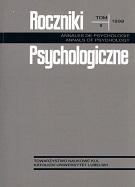Altruizm w koncepcji socjobiologicznej
Altruism in the Sociobiological Conception
Author(s): Jacek ŚliwakSubject(s): Psychology
Published by: Towarzystwo Naukowe KUL & Katolicki Uniwersytet Lubelski Jana Pawła II
Summary/Abstract: Sociobiology is a theory which has a bigger and bigger influence on the social sciences, and recently on social psychology. The paper seeks to show altruism as regards the assumptions of that conception. Since the question of sociobiology does not occupy too much place in Polish psychological literature, the paper has been prefaced by a short historical outline of the problem. The sociobiological conception undertakes the problems of altruism, asking first of all, whether it is an adaptive behaviour. The representatives of that theory suggest that there are two types of altruistic behaviour which may be adaptive: 1) A behaviour that increase the of one’s own offspring to survive, 2) altruistic behaviour which will be reciprocated. Wilson, the founder and main representative of that theory, was convinced that his sociobiological theory was a "supplement of The Darwinian revolution". He would perceive that supplementation in the fact that he managed to explain in purely biological categories the following human behaviour: altruism, religiosity and values. He believed that they undergo natural selection. In the closing part of the paper we find a critical reference to Wilson’s standpoints and the sociological conception. It has been shown that altruism, apart from biological explanations given by sociologists, may by accompanied by psychological and social explanations. The paper stresses that altruism my be an outcome of man’s ability to transcend himself, to overcome his own biological conditions. Many authors, e.g. Gould (cf. Mussen, Eisenberg-Berg, 1977), think that the explanation of human social behaviours in terms of heredity is only probable, but one has to be aware that there are others, "non-genetic" attempts at an explanation of those behaviours and they are equally probable.
Journal: Roczniki Psychologiczne
- Issue Year: 2/1999
- Issue No: 1
- Page Range: 111-123
- Page Count: 13
- Language: Polish

